|
|
|
Sort Order |
|
|
|
Items / Page
|
|
|
|
|
|
|
| Srl | Item |
| 1 |
ID:
120111
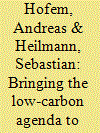

|
|
|
|
|
| Publication |
2013.
|
| Summary/Abstract |
This study traces the transnational interactions that contributed to introducing the low-carbon economy agenda into Chinese policymaking. A microprocessual two-level analysis (outside-in as well as inside-access) is employed to analyse transnational and domestic exchanges. The study provides evidence that low-carbon agenda-setting - introduced by transnational actors, backed by foreign funding, promoted by policy entrepreneurs from domestic research institutes, propelled by top-level attention, but only gradually and cautiously adopted by the government bureaucracy - can be considered a case of effective transnational diffusion based on converging perceptions of novel policy challenges and options. Opinion leaders and policy-brokers from the government-linked scientific community functioned as effective access points to the Chinese government's policy agenda.
|
|
|
|
|
|
|
|
|
|
|
|
|
|
|
|
| 2 |
ID:
137403
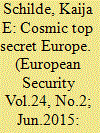

|
|
|
|
|
| Summary/Abstract |
As the EU has expanded its authority into areas of high politics such as monetary, defense, and foreign policy, it has simultaneously developed procedures for handling more sensitive and classified information. These critical policy domains require standards regulating secure information and personnel, but the concept of official secrets is in tension with the treaty norms of the EU. Observers allege that the classified information policy of the EU was imposed through the coercion of external actors such as North Atlantic Treaty Organization (NATO) and the USA in a significant historical departure from the information security policies of European member states. This article evaluates the content of EU-classified information policies and compares them to the content of European member states, NATO, and the USA, in an effort to clarify the mechanisms of policy diffusion in the area of information security.
|
|
|
|
|
|
|
|
|
|
|
|
|
|
|
|
| 3 |
ID:
146536


|
|
|
|
|
| Summary/Abstract |
The democratization of politics has been accompanied by a rise of Islamic laws in many Muslim-majority countries. Despite a growing interest in the phenomenon, the Islamization of politics in democratizing Muslim-majority countries is rarely understood as a process that unfolds across space and time. Based on an original dataset established during years of field research in Indonesia, this article analyzes the spread of shari’a regulations across the world’s largest Muslim-majority democracy since 1998. The article shows that shari’a regulations in Indonesia diffused unevenly across space and time. Explanations put forward in the literature on the diffusion of morality policies in other countries such as geographic proximity, institutions, intergovernmental relations and economic conditions did not explain the patterns in the diffusion of shari’a regulations in Indonesia well. Instead, shari’a regulations in Indonesia were most likely to spread across jurisdictions where local Islamist groups situated outside the party system had an established presence. In short, the Islamization of politics was highly contingent on local conditions. Future research will need to pay more attention to local Islamist activists and networks situated outside formal politics as potential causes for the diffusion of shari’a law in democratizing Muslim-majority countries.
|
|
|
|
|
|
|
|
|
|
|
|
|
|
|
|
| 4 |
ID:
162952
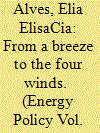

|
|
|
|
|
| Summary/Abstract |
How do renewable energy policies (REPs) diffuse internationally? Are there differences between developed and developing countries? Which actors are diffusing these REPs? Also, what predominates when considering REP diffusion, national or international factors? The goal of this paper is to analyze the main vectors and actors that influence renewable energy policy adoption and identify differences between developed and developing countries. We access those questions by a mixed method analysis: quali and quantitatively. First, we discuss qualitatively the main external, intermediate and internal actors behind international wind energy policies diffusion. Then, we estimate a Poisson regression model using data for 194 countries, 102 of which are developing countries, from 2005 to 2015 testing the role of policy diffusion mechanisms on renewable energy policy diffusion. Among the main results, we found strong evidence of socialization and learning on international policy diffusion to developing countries, while domestic factors play a major role, especially with regard to market liberalization in developed countries. We also show some of the key actors related to REPs and we note that the causal mechanisms that lead to the adoption of REPs may differ among countries according to their level of economic development.
|
|
|
|
|
|
|
|
|
|
|
|
|
|
|
|
| 5 |
ID:
101416
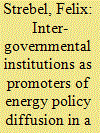

|
|
|
|
|
| Publication |
2011.
|
| Summary/Abstract |
This article is about diffusion processes behind the innovation of sub-national energy policy measures in a federal system. Typically for the federal political system in Switzerland, the elements of the energy policy field are shaped by the principle of subsidiarity. The aim is that cantons promote innovative problem solutions and regionally adapted implementation. For this reason, policy differences between cantons are large and create a need for coordination. More concretely, I will analyze the impact of inter-cantonal institutions on different innovations in the field of energy policy. The research question is approached with an event history analysis on three different innovative measures in the Swiss cantons from 1990 to 2007. A more comprehensive picture of diffusion in one policy field is drawn with this approach. The main contribution of this paper is the finding that intergovernmental institutions promote diffusion in one policy field only for measures with certain characteristics. The internal determinants are therefore not a sufficient explanation.
|
|
|
|
|
|
|
|
|
|
|
|
|
|
|
|
| 6 |
ID:
193211
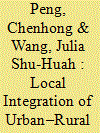

|
|
|
|
|
| Summary/Abstract |
This study investigates what drives local variations when pursuing urban–rural equity in social welfare provision in China. We examine how internal features, top-down pressure and horizontal competition have shaped local governments’ decisions to adopt a policy that unifies (yitihua) the urban and rural eligibility thresholds of the world's largest means-tested cash transfer programme (dibao). We collected and coded policies that unify urban–rural dibao thresholds in 336 prefecture-level divisions between 2011 and 2019. Event history analysis showed that internal fiscal constraint – primarily cost concerns – drove local policy adoption; top-down pressure from provincial governments with a high degree of coercive power in policy directives exerted a significant impact; and the horizontal competition's effect was insignificant. Our findings indicate that fiscal arrangements and top-down policy directives from superior governments with higher coercive power are potent tools to accelerate the adoption of a social welfare policy that would otherwise be unappealing for local officials.
|
|
|
|
|
|
|
|
|
|
|
|
|
|
|
|
| 7 |
ID:
099118
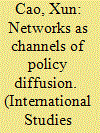

|
|
|
|
|
| Publication |
2010.
|
| Summary/Abstract |
This paper studies policy changes in capital taxation by focusing on policy interdependence induced by network dynamics at the international level. The empirical findings indicate that the competition mechanism induced by network position similarity in the network of portfolio investment and that of exports causes policy diffusion in corporate taxation; the socialization mechanism (policy learning and emulation) induced by network position proximity in the IGO networks also drives policy changes, and the evidence is much stronger in the IGO networks that facilitate policy learning than in those that facilitate emulation. The paper also discusses explicitly empirical challenges to incorporate network characteristics into connectivity matrices in spatial lag models often used to study policy diffusion. It suggests that students of policy diffusion should discuss as explicitly as possible the assumptions and procedures to construct connectivity matrices and present results from alternative specifications: our conclusion on the strength of policy diffusion is often sensitive to the choice of connectivity matrices.
|
|
|
|
|
|
|
|
|
|
|
|
|
|
|
|
| 8 |
ID:
147248
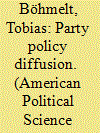

|
|
|
|
|
| Summary/Abstract |
Do parties learn from or emulate parties in other political systems? This research develops the argument that parties are more likely to employ the heuristic of learning from and emulating foreign successful (incumbent) parties. Spatial-econometric analyses of parties’ election policies from several established democracies robustly confirm that political parties respond to left-right policy positions of foreign political parties that have recently governed. By showing that parties respond to these foreign incumbent parties, this work has significant implications for our understanding of party competition. Furthermore, we contribute to the literature on public policy diffusion, as we suggest that political parties are important vehicles through which public policies diffuse.
|
|
|
|
|
|
|
|
|
|
|
|
|
|
|
|
| 9 |
ID:
147542


|
|
|
|
|
| Summary/Abstract |
Decentralised policymaking in China is often cited as a key success factor in economic reform and authoritarian resilience. Although the existing literature presents policy diffusion as a technocratic process where socially optimal policies diffuse, many examples exist where the reverse is true or where the central government sanctioned local innovation but the policy diffuses to other places regardless. The author contends that policy diffusion in authoritarian regimes should be understood as a political process, where local officials serve as policy entrepreneurs, rather than a technocratic one. Subnational officials do not respond uniformly to either incentives from the central government or local pressure, but rather adopt experimental policies as a strategy learned from other successful officials. Policy experimentation has emerged as a strategy for officials desiring either career advancement or security, resulting in an S-shaped curve of policy diffusion characteristic of a learning process whereby a few initially innovate but others quickly adopt the experiment once viewed as successful.
|
|
|
|
|
|
|
|
|
|
|
|
|
|
|
|
| 10 |
ID:
120722
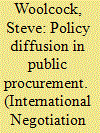

|
|
|
|
|
| Publication |
2013.
|
| Summary/Abstract |
Abstract This article assesses the factors shaping policy diffusion of effective, liberal public procurement regimes. Policy diffusion and the analysis of policy diffusion is less developed in public procurement than other policy areas such as investment. This is surprising given the potential economic (public procurement accounts for some 8% of GDP) and signaling (transparency, good governance) gains of adopting regimes that promote competition in public procurement markets. The article first provides an introduction to the issue of public procurement and discusses the nature of procurement regimes, the dependent variable. It then assesses the impact of key variables identified in the literature on policy diffusion, such as competition, coercion and norm emulation. It is argued that issue linkage in bilateral free trade agreements (FTA) appears to have brought about common laws - and in some cases - rules for procurement. But this stops short of a genuine diffusion of liberal procurement regimes due to negotiations being framed by reciprocity rather than efficiency considerations, the costs and complexity of implementation, as well as opposition from vested sector interests and politicians at all levels of government favoring the short term political utility of 'buy local' policies.
|
|
|
|
|
|
|
|
|
|
|
|
|
|
|
|
| 11 |
ID:
119685
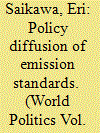

|
|
|
|
|
| Publication |
2013.
|
| Summary/Abstract |
In a dramatic example of policy diffusion, the past three decades have witnessed the spread of automobile emission standards throughout the world. Contrary to fears that global competition would produce a race to the bottom, there appears to be a race to the top, not only among rich countries but also among poor ones. Using econometric analysis of the adoption of automobile emission standards over the past twenty years for 129 countries, the author argues that this global diffusion results from countries' efforts to stay competitive in the international market. Due to the pressure from importing countries that have adopted stringent emission standards, even developing countries have rapidly moved to adopt rich country standards. The evidence shows that adoption of automobile emission standards correlates with an increase in the total value of automobile exports. Under some conditions, economic incentives in a global market can be a complement to environmental protection.
|
|
|
|
|
|
|
|
|
|
|
|
|
|
|
|
| 12 |
ID:
154370
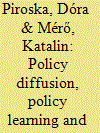

|
|
|
|
|
| Summary/Abstract |
This article explains why certain Central and Eastern European states adopted macroprudential policies of local design that went beyond what European Union and International Monetary Fund authorities had recommended after the global financial crisis. We argue that macroprudential policies increase state control not only because of their inherent normative view on the inefficiency of markets, but also because governments use macroprudential policy to enhance state power. We show that macroprudential tools have often been used to satisfy local policymakers’ own agendas: financial nationalism in Hungary and protectionism in Slovakia.
|
|
|
|
|
|
|
|
|
|
|
|
|
|
|
|
| 13 |
ID:
092262


|
|
|
|
|
| Publication |
2009.
|
| Summary/Abstract |
When China embarked on economic reform in the late 1970s, its leaders aspired to learn from Japan's developmental policies that were restrictive of foreign capital. In the 1990s, China strove again to emulate Japan and South Korea in restricting foreign direct investment and promoting indigenous corporations. Despite these efforts, China's industrial catch-up was in fact led by FDI, in sharp contrast to the classic Japanese/Korean paradigm where FDI was strictly circumvented. Why was China unsuccessful in learning restrictive FDI policies? How did a new developmental path emerge in China? The answer lies in China's strong networks with diaspora communities. Through a diffusion mechanism, ties between local governments and diaspora capital helped initiate and catalyze China's FDI liberalization, despite the central efforts to learn from Japan and South Korea. Two critical reform episodes are examined: (1) the establishment of special economic zones and (2) the reform of state-owned enterprises.
|
|
|
|
|
|
|
|
|
|
|
|
|
|
|
|
| 14 |
ID:
180251
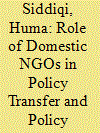

|
|
|
|
|
| Summary/Abstract |
Pakistan is a fragile democracy repeatedly facing problems in the design and implementation of police reforms. The scholarship on public policy highlights the role of non-state actors like NGOs in improving policies, especially through policy transfer and diffusion. In 2002, Pakistan designed a police reform, PO 2002, through collaborative methods, and implemented it nationwide for a short time. Using process tracing within case study and interviews with key informants, this article evaluates the role of domestic NGOs in the design, implementation and change of PO 2002, with special focus on policy transfer and policy diffusion. The evidence collected showed that in 2000, the nascent NGOs lacked expert knowledge to make any contribution to policy transfer. Later, their absence from the implementation phase and faulty methods blinded them from unveiling the critical policy lessons and impeded their ability to play any credible role in future policy diffusion.
|
|
|
|
|
|
|
|
|
|
|
|
|
|
|
|
| 15 |
ID:
109938


|
|
|
|
|
| Publication |
2011.
|
| Summary/Abstract |
Bilateral investment treaties (BITs), agreements that provide extensive rights and protection to foreign investors, were first adopted in the 1960s, proliferated in the late 1980s and 1990s, especially among developing countries, and seemingly fell out of fashion after 2001. To explain this life cycle of diffusion across the international state system, we argue that BIT signing followed a traditional logic of diffusion for an innovation albeit here in the policy realm. In the first period, BITs provided a solution to the time inconsistency problem facing host governments and foreign investors. In the second period, these treaties became the global standard governing foreign investment. As the density of BITs among peer countries increased, more countries signed them in order to gain legitimacy and acceptance without a full understanding of their costs and competencies. More recently, as the potential legal liabilities involved in BIT signing have become more broadly understood, the pattern of adoption has reverted to a more competitive and rational logic. Our empirical tests of BIT signing over four decades provide evidence for such a three-stage model.
|
|
|
|
|
|
|
|
|
|
|
|
|
|
|
|
| 16 |
ID:
089004
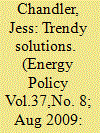

|
|
|
|
|
| Publication |
2009.
|
| Summary/Abstract |
Thirty-four states had adopted Sustainable Energy Portfolio Standards (SEPS) or similar goals by the end of 2008, with 14 adoptions since 2006. There appears to be something trendy about SEPS and states may adopt SEPS when internal variables would indicate otherwise. This analysis extends the current discussion of SEPS adoption beyond internal variables, relying on innovation and diffusion theory. Logistic regression with SEPS adoption as the dependent variable is used to test internal determinants and diffusion measures for the years 1997-2008. Of the internal determinants variables, affluence and government ideology were found to be positive and significant. The results show that regional and neighbor diffusion variables are significant in SEPS adoption decisions-even when accounting for ideological distance from previous adopters.
|
|
|
|
|
|
|
|
|
|
|
|
|
|
|
|
| 17 |
ID:
121751


|
|
|
|
|
| Publication |
2013.
|
| Summary/Abstract |
Most quantitative analyses of policy convergence treat transnational communication in international organisations and domestic economic problems as additive factors. By contrast, this article argues that domestic economic problems motivate governments to search for successful policies, while international organisations offer channels for policy learning. Thus, both factors interact, magnifying each other's effects. The argument is corroborated by a quantitative analysis of the privatisation of telecommunications providers in the Western OECD world. A dyadic logit model shows that joint membership in international organisations increases the likelihood of policy convergence if governments face budget deficits. The argument of the article builds a bridge between theories of international organisations and domestic theories of policy making. Theories of the former gain an important scope condition specifying the conditions under which transnational communication works, while exploring the latter gains a theory specifying where new policy ideas come from.
|
|
|
|
|
|
|
|
|
|
|
|
|
|
|
|
| 18 |
ID:
111905


|
|
|
|
|
| Publication |
2012.
|
| Summary/Abstract |
Although it is widely accepted that a decentralised system can enhance policy learning and the spread of best practices, an under-researched question is where that learning process takes place. Using data on the diffusion of health care policies in Switzerland, this article analyses the role of institutionalised intergovernmental cooperation and its impact on the spread of successful policies. The results show that joint membership of policy makers in health policy specific intergovernmental bodies is related to the diffusion of best practices.
|
|
|
|
|
|
|
|
|
|
|
|
|
|
|
|
|
|
|
|
|